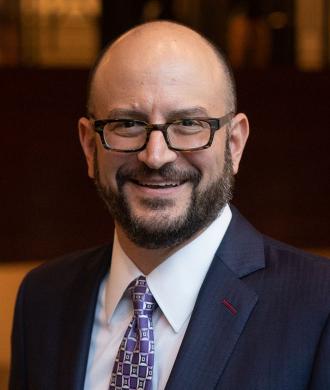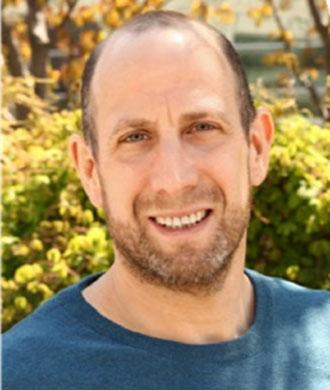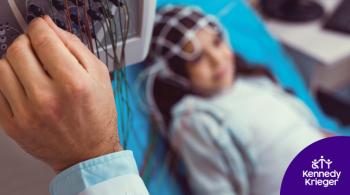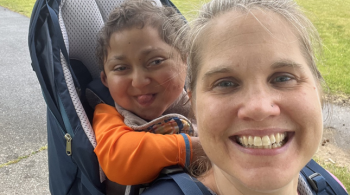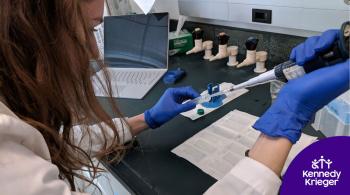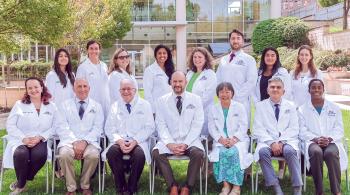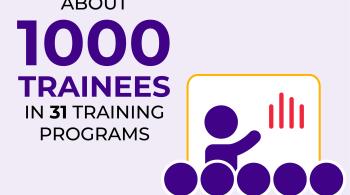In this month's episode of Your Child's Brain ADHD is discussed with:
- Dr. Brad Schlaggar, President and CEO at Kennedy Krieger Institute
- Dr. Stewart Mostofsky, Pediatric neurologist and Director of The Center for Neurodevelopmental and Imaging Research
- Dr. Keri Rosch, Psychologist for Kennedy Krieger Center for Neurodevelopmental and Imaging Research
Learn More About Our Featured Speakers
Learn More About Our Featured Speakers
View Episode Transcription
Brad Schlaggar (BS): Welcome to Your Child's Brain. A podcast series produced by Kennedy Krieger Institute with assistance from WYPR. I'm Dr. Brad Schlaggar, President and CEO of Kennedy Krieger Institute. Today for this seventh episode of Your Child's Brain, we will be discussing the most common disorder of neurodevelopment, attention deficit hyperactivity disorder, or ADHD. I'm joined by my colleagues, Dr. Keri Rosch, psychologist in Kennedy Krieger Center for Neurodevelopmental and Imaging Research, and Dr. Stewart Mostofsky, pediatric neurologist and the director of the Center for neurodevelopmental and imaging research. Welcome, Keri and Stewart. Stewart, let's start out with setting the table. What is ADHD, how common is it, and how do you diagnose it?
Stewart Mostofsky (SM): Thank you Brad. ADHD is, as you mentioned, the most common psychiatric disorder of childhood affecting approximately 8-10 percent of school-age children. It is characterized by age inappropriate levels of impulsive, hyperactive, and distractible inattentive behavior that has a detrimental impact on functioning across multiple settings, such as school, home, and social environments. If not addressed, it can be associated with significant functional impairment into adolescence and adulthood, including impaired social relations, difficulties at school and work, struggles with substance use in a range of mental health difficulties. If there is suspicion about ADHD, it is important that it be diagnosed using a comprehensive evaluation than addressed using a range of options. US how it's diagnosed, and there are three key aspects to diagnosing ADHD. First, confirming the presence of ADHD symptoms and that these symptoms are occurring across multiple settings. This typically involves clinical interviews with the child, with parents and other caregivers. Along with having parents caregivers, as well as teachers, complete rating scales regarding ADHD behaviors. Second, confirming that these symptoms are resulting in impairments and functioning across multiple settings. Again, typically homeschool and social settings. Third, determining that these symptoms are not due to other difficulties. For instance, learning disabilities, such as reading disability, can contribute to difficulty focusing in school and while doing homework and therefore mimic ADHD symptoms. Another example might be anxiety, which in some children can contribute to excessive hyperactivity distractibility, again, mimicking ADHD symptoms. One thing that complicates this process is that these diagnoses such as reading disability and anxiety and other mental health issues, can both mimic the symptoms of ADHD and alternatively can occur in conjunction with ADHD. A careful in-depth evaluation that includes addressing these issues is really crucial.
BS: Well thanks. That's a great comprehensive way to start off the discussion. I mean, you describe really a complicated set of interacting features. I imagined it also can change over the course of development. Keri, maybe take on how does ADHD differ between age groups? Then maybe take on also the question of sex effects. What is a sex effect in ADHD, and how does that differ from a gender effect?
Keri Rosch (KR): First, we know that ADHD is a chronic life-long condition that needs ongoing monitoring and support. The way that we treat ADHD may change with development, the way the symptoms present can change with development. Specifically in terms of symptom presentation, we tend to see that inattentive symptoms of ADHD may persist or even worsen and from adolescence into adulthood, whereas the hyperactive and impulsive behaviors that we see in ADHD are more often present in childhood and they tend to decrease with age. But there's also a lot of discussion about how in adults and adolescents there could be different symptoms of impulsivity and the hyperactive behavior might decrease, but you could see more impulsive decision-making or risk-taking, so we're still working on refining our diagnostic understanding for adolescents and adults with ADHD. In terms of the sex differences or gender effects, this is a new area of research that we're really trying to understand in individuals with ADHD, but we do know that it's more common in males than females with prevalence rates. Previously thinking to be about 4-1 male to female ratio, but now it's closer to 2-1 in part because we're recognizing that ADHD may look different in females. Males do tend to present more with hyperactive and impulsive symptoms than females do. Often males have more co-occurring disruptive behavior, especially in childhood. They're often diagnosed at a younger age because those symptoms can be more impairing, especially in a classroom setting if they're more disruptive to the peers in the ongoing instruction. Females we do tend to see more of the inattention and they're often diagnosed later maybe into early adolescence as demands for intention increase. Also we're really still trying to understand these differences between males and females with ADHD. How much of this is a function of biological sex at birth, just in terms of their sex chromosomes and that's related to their biological sex versus gender as a social construct. What I mean by that is gender expression, identity, gender roles and our beliefs about gender. For example, we know that brain development differs among males and females defined by their biological sex. This might relate to sex differences in ADHD symptom presentation at different times in development, but also our societal expectations regarding how girls and boys typically behave, which refers to gender, may impact parent and teacher perceptions of problematic behavior and ultimately the diagnosis of ADHD.
BS: That's excellent. That's really important to make clear that sex and gender just are not interchangeable terms, and you really laid it out very nicely there. Thank you. I wonder if you could could go on with talking about treatments for ADHD and when do parents and clinicians need to recognize that it's time to begin treatment. I guess along those same lines, are there differences in treatments for boys and girls?
KR: Yeah, sure. Great question. Evidence-based treatments for ADHD include behavioral therapy and generally stimulant medication as a first-line, although there are non stimulant medications that are also approved and recommended for ADHD. There's research over decades now showing that these combined treatments, meaning behavioral therapy and medication, can be the most effective. Often when done in combination, you can have a lower dose of medication if paired with behavior therapy and get greater improvement. Because I know many parents will have concerns about using medications, so that's a nice compromise if you do both together. We also know that behavioral treatments are more likely to result in long-term effects because your teaching skills and strategies, whereas medication only works as long as you're taking it. Once you stop the medication, those symptoms will resume. Behavioral treatment, what does that mean? What does behavioral therapy for ADHD, especially in childhood, it starts with behavioral parent training and teaching. Parents really had a management their child's symptoms, and also informing teachers about how to manage symptoms of ADHD in the classroom. Because these symptoms are present across setting, we really need to support kids in both settings. Sometimes for parent training, this is best done in a group format where parents can hear from other parents of children with ADHD about their struggles at home and what's working and not for their children. We can learn a lot from other parents on our treatments, and often there's a therapist that will guide that discussion. Also sometimes we'll do kids social skills groups so that's a therapy that will involve the child or emotion regulation groups. We know that emotion regulation difficulties are common in 30-50 percent of children with ADHD, so teaching kids how to identify their emotions, how to regulate them, rather, had to deal with those angry and sad feelings in a way that's more adaptive. Also in adolescence and adulthood, we're involving the child or a patient themselves in therapy more so than the parents where we're teaching them skills for managing their own symptoms at school and with peers. In adulthood that would include strategies like cognitive behavioral therapy too. In children sometimes we'll see that cognitive-behavioral therapy is needed if they often have symptoms on anxiety or depression that go along with their ADHD. But again, the first-line behavioral therapy is really teaching parents how to be their child's therapists at home because these symptoms have to be managed constantly throughout the day, not just in a one-hour therapy session each week. Right now, we don't treat girls and boys with ADHD differently. We treat the symptoms that they're presenting with, but there's not designated treatments for girls versus boys. But as we do more research on understanding these sex versus gender effects that might inform these treatments.
BS: Stewart, let's pick up on the topic of therapies and interventions. What do you see as around the corner on the new vistas for treatment for ADHD?
SM: There were a number of new treatment approaches in some medications, but what seemed to be some promising behavioral approaches that really have the opportunity to bring long-lasting, potentially even lifelong improvements for individuals with ADHD. One such approach that we've been investigating is the use of mindfulness movement and the interventions such as yoga, still meditation, and Tai chi. In fact, last year we published findings from our laboratory demonstrating that children showed a significant improvement in ADHD and other behaviors after an eight-week Tai chi intervention. Interestingly, we also found that these children showed improvements in motor function. The degree of motor improvements predicted the degree to which parents reported improvements in ADHD behavior. The findings suggests that mindful movement practice holds promise for helping children, perhaps not only those with ADHD, but even all children to build skills needed to focus and better regulate their behavior. This is similar in a way to how practice and exercise can help build motor skills. You're building these skills, focusing, staying on task and regulating your behavior. What's exciting is that in contrast to how medications work, these skill gains in focusing and regulating behavior could be long-lasting and perhaps even lifelong. Next steps we're looking to examine whether the positive impacts of mindful movement interventions such as Tai chi are sustainable for children with ADHD. We also have a project now where we are providing mindful movement intervention with elementary school children in a Baltimore City Public School as part of their regular school day curriculum. We already have evidence of positive impacts with these Baltimore City school children and are really excited about the potential for this approach in helping a wide range of vulnerable children, including those with ADHD.
BS: That's very exciting to hear about. Keri, there's a whole bunch of stigma associated with disorders of mental health like ADHD. What are some of the myths that go along with ADHD? For individuals that have the diagnosis, for example, you often hear that people with ADHD can't be successful in school, at work, and in life in general. Can you debunk some of those myths?
KR: I will start with that first one. Honestly, these are the questions that when I'm doing my assessments for children with ADHD and their parents trying to address some of these meds is really important so they understand their child's prognosis. Children with ADHD can absolutely go on to be very successful, high-functioning adults pursuing what they're passionate about and what they want to with their lives. It's just about, as I mentioned earlier, really understanding their particular symptoms and the impairment on their functioning, how to support them, and how to identify their strengths and the settings and environments that they will succeed in so you can adapt that for them. Another myth I often hear is that ADHD can be diagnosed with a brain scan. We need to get some pictures of their brain and that'll tell us if they have ADHD. I love doing neuroimaging research, but we're not at that point yet. Maybe someday that will be part of how we understand a diagnosis of ADHD. But really, we see differences at the group level where we compare groups of children with and without ADHD regarding how their brain scans may look. But it's not at the individual level use for diagnosis. Also, many people think that therapy for ADHD involves sending their child to speak with a therapist each week and parents aren't involved. But a big point I try to communicate to parents, is that how important it is for them to be involved in that therapy. It's really the first way we address ADHD symptoms. Lastly, a big method that concerns about treating a child with a stimulant medication that they might become addicted or that it can be harmful. Of course, under the guidance of a medical professional, they should be monitoring for side effects of stimulant medication. But we also know that treating a child with ADHD with medication or therapeutic approaches actually reduces educational underachievement, reduces risk for depression and suicide and substance abuse, cigarette smoking even, and accidental injury such as traumatic brain injury, criminal activity as well as teenage pregnancy. So really not treating ADHD with either therapies or medication could be more detrimental. Those are some of the common myths that I've come across.
BS: Picking up on this theme of transitioning across development. Stewart, maybe pick up the points about how ADHD changes as children transition into adolescence and into young adulthood.
SM: As Keri mentioned, there are changes that we see in ADHD presentation throughout the lifespan. It's more common that younger children show difficulties with hyperactivity and impulsivity. Difficulty sitting still, fidgeting, difficulty waiting their turn, interrupting. As people mature, they tend to be able to control these behaviors a bit better. Into adolescence, they tend to show less hyperactive impulsive behavior. The difficulties that are shown in adolescence and adulthood tend to be ones that are related to the inattentive behavior, difficulty focusing and staying on task, as well as difficulty with being able to organize their daily lives, we know as people get older, there's increased expectation for them to be able to self-organize, to manage their days, their weeks, their months. People with ADHD tend to show more difficulty with these organizational abilities, sometimes referred to as executive function.
BS: Keri, let's go back to the issues around education to children who are diagnosed with ADHD. Can you describe what educational or accommodated supports they may need at school?
SM: Sure. Actually I could have included this in one of the myths too, that parents often think that their child needs special education if they are diagnosed with ADHD and they are requesting an individualized education plan or IEP for a child once they have this diagnosis. But many children with ADHD do not need that level of educational instruction or support. So special education means that they couldn't really access the general education curriculum. But we recommend as psychologists as supporting children with ADHD in the classroom through educational accommodations. This might be things that would be included in a 504 plan, which is not a legal document like an IEP that requires ongoing assessments and it's just a little bit less of a legal contract in that sense. But these educational supports and accommodations are a list of strategies that teachers can do in the classroom to support a child with ADHD, such as redirecting them to the task that's presented to them, giving them extended time, working in a quiet setting during activities that really require them to focus a little bit more. Whereas special education would really only be indicated if there was co-occurring specific learning disorders that needed to be addressed with educational interventions at that child's level of learning or if their symptoms severity interferes with their ability to be in the classroom setting. Like if they could potentially be so hyperactive, but they can't stay in their seat and they need a one-to-one aide to sit with them and keep them on task. That would be more of a special education support. That's more common in younger children. I would say as children with ADHD advance through school, these are the supports that we can offer through a 504 plan are usually sufficient unless there's these co-morbidities with learning disorders that need to be addressed.
BS: Keri, Stewart, we have one minute left, so in this last minute, each of you, what's the best advice you can give to parents whose child has been diagnosed with ADHD? Keri we'll start with you and then Stewart.
KR: I think starting with that comprehensive evaluation to get an accurate diagnosis, to inform treatment planning and identify areas of strength and then really building on those strengths for your child to help them build confidence and self-esteem and feel successful in the areas where they are intended to do so. That would probably be the most important information I try to share with parents.
BS: Stewart?
SM: Recognizing that it's a chronic life-long condition often, so keeping that in mind, that it may require ongoing management support for a number of years. With that, recognizing that comprehensive treatment approaches are therefore really crucial. Not just simply focusing on medication, but also considering behavioral approaches such as mindfulness, movement, intervention that can really provide potentials for sustainable benefits and create a foundation that can be lifelong for better regulating behavior, better controlling how we focus and stay on task.
BS: Well, thank you, Stewart, Keri. You guys are a wonderful resource of expertise. It's a brief discussion of ADHD. There's much more to talk about, but I greatly appreciate it. You've been listening to Your Child's Brain. Your Child's Brain is produced by Kennedy Krieger Institute with assistance from WYPR and producer Spencer Bryant. Please join us next time as we examine the mysteries of your child's brain. [MUSIC]

